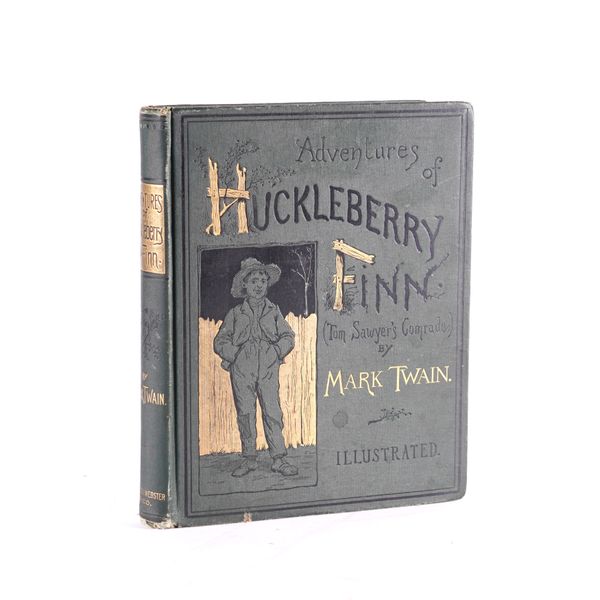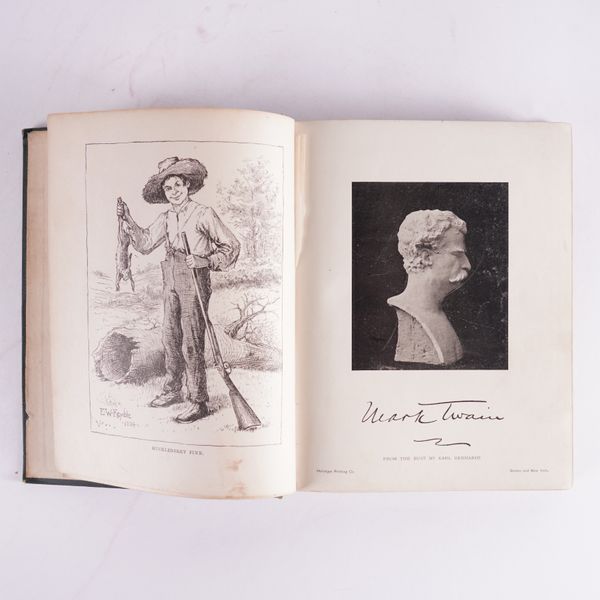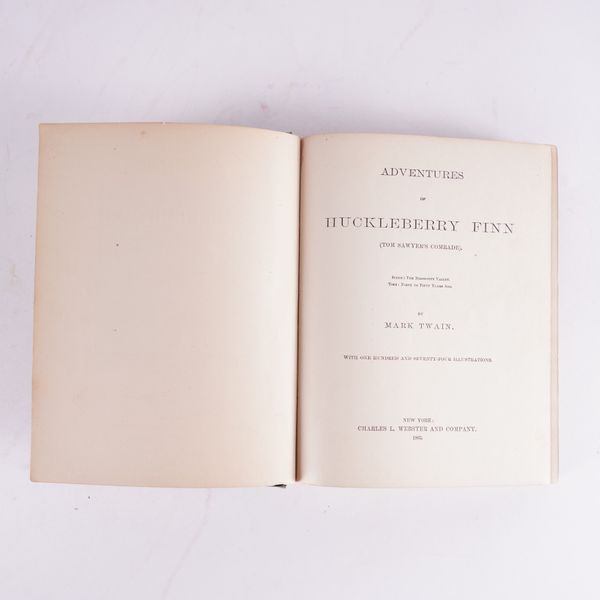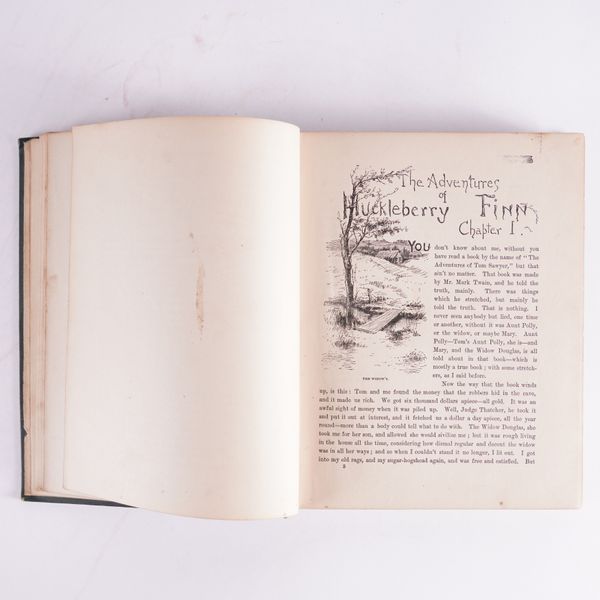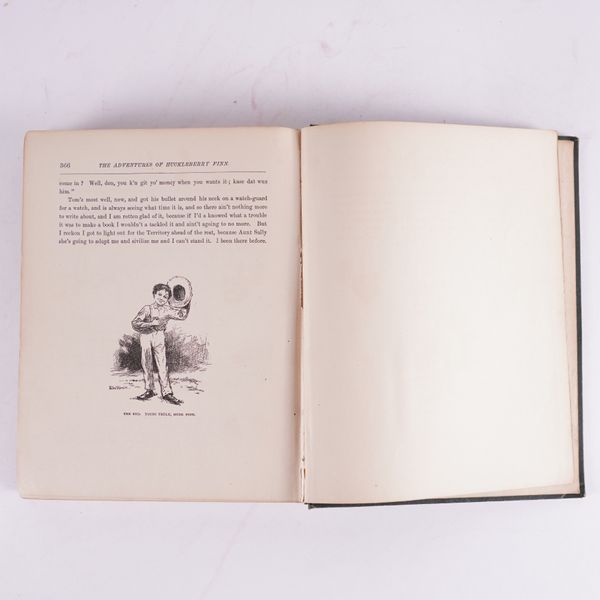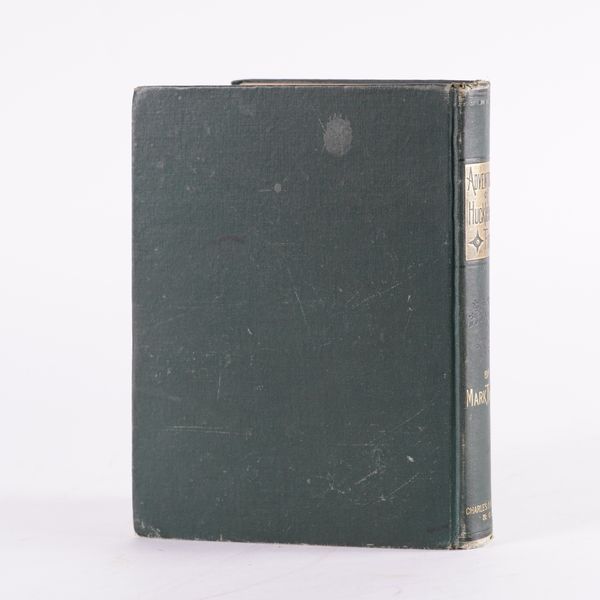"TWAIN, Mark" (1835-1910). Adventures of Huckleberry Finn, New York, 1885, 8vo, frontispiece, heliotype portrait, illustrations by E. W. Kemble, original green cloth. FIRST AMERICAN EDITION, FIRST ISSUE, of "one of the great works of American fiction."
| Estimate: | £2,000 - £3,000 |
"TWAIN, Mark" [i.e. Samuel Langhorn CLEMENS (1835-1910)]. Adventures of Huckleberry Finn (Tom Sawyer's Comrade). Scene: The Mississippi Valley. Time: Forty to Fifty Years Ago. New York: Charles L. Webster and Company, 1885. Large square 8vo (214 x 170mm). Half title, wood-engraved frontispiece by Edward Winsor Kemble dated 1894, heliotype plate of a bust of the author sculpted by Karl Gerhardt, 173 wood-engraved illustrations by Kemble (light stain at lower margin of frontispiece, portrait lacks tissue guard, some light staining and browning, a few darker spots). Original green publisher's pictorial cloth gilt (extremities rubbed, some light scuffing and scratching to covers, nick at lower edge of upper cover, small faint stain to lower cover). Provenance: from the Collection of David Kotthoff. FIRST AMERICAN EDITION, FIRST ISSUE, of "[Twain's] masterpiece and one of the great works of American fiction." Please note the following issue points in the present copy: the portrait has the imprint "Heliotype Printing Co." and has the tablecloth clearly visible beneath the bust of the author; the title is a cancel with the copyright date on the verso given as 1884; p.[9] has "Huck decided to Leave" under the heading for Chapter VI (in later issues it was changed to "decides"); p.[13] has the illustration "Him and another Man" wrongly listed as being at p.88 (in later issues it was corrected to p.87); p.57, in the 23rd line, has the reading "... with the was ..." (in later issues it was corrected to "... with the saw ..."); p.155 has the last "5" missing from the pagination; p.283 is a cancel of the defaced engraving and has the corrected version. The publishers issued three different bindings simultaneously (leather, green cloth and red cloth) and none are assigned precedence. "[Huckleberry Finn is] generally accepted as [Twain's] masterpiece and one of the great works of American fiction ... Perennially popular as an adventure story, the novel is also a profound moral commentary on the nature of the 'American experience' and the institution of slavery, and a vital contribution to the myth of the frontier, told with a freshness and raciness that shocked some if its readers, and has given rise to many theses on the subject of 'Southern Humour'. Twain's use of the innocent narrator to present oblique moral judgement is masterly, and his use of the vernacular extremely sensitive" (The Oxford Companion to English Literature, ed. Drabble, 1985). "All modern American literature comes from one book by Mark Twain called Huckleberry Finn. It's the best book we've had. All American writing comes from that. There was nothing before. There has been nothing as good since" (Ernest Hemingway, Green Hills of Africa, 1935). Please note that the green of the binding is much brighter than it appears in our catalogue illustrations. BAL 3415; Grolier 100 American Books 87; Johnson pp.43-50; MacDonnell 31; McBride 93.
